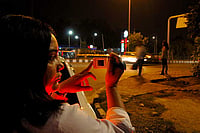Fan Club
- Much of the “Modi fever” in Gujarat is the result of his vocal women followers and fans
- Most of Modi’s women followers are from the cities and belong to the middle or upper middle class
- Working women and business women point out how they feel safe in Gujarat’s cities
- Modi’s development agenda too has resonance with them
- A strong go-getter, that’s what women see Modi as
***
Narendra Modi is quite the ladies’ man, so it would seem in the cities of Gujarat. Many of his unabashed fans are modern, working Gujarati women. Meera K. Selarka, an insurance advisor from Ahmedabad, in her early fifties, says Modi is the only leader she has worshipped since Indira Gandhi. “Labelling Narendra Modi as a political star or hero amounts to limiting the appeal of his personality,” she gushes. “In my social circle, most of us feel he’s the best thing to have happened to Gujarat. There’s been no leader like him for decades. India needs a politician like him.” Zarna Sheth, a fashion designer from Baroda, calls the sweeping wave of female support for the chief minister “Modi fever”. She says, “My mother-in-law and my teenaged daughter—both are equally in awe of him. Let’s face it, he has brought about a kind of revolution. We all associate Modi with positive development. He has instilled in us a sense of self-confidence.”
LensOnNews, an online media site, conducted an opinion poll of 12,078 voters after the filing of nominations was over. It only confirmed what is well known—that Modi enjoys a significantly higher popularity among women than among men. Indeed, in the eyes of urban, middle-class Gujarati women, Modi can do no wrong. If his detractors expose the underbelly of Gujarat’s growth model—low literacy, the worsening of the lot of the poor, marginalisation of women and the loss of livelihoods and resource bases—they will be dismissed in a hurry.
Modi has uncannily emerged as a larger-than-life figure, a saviour of urban women from the big, bad world. The sweeping confidence in him stems possibly from the view that he, as a strong, male leader who gives impressive speeches, has managed to offer what women value: a sense of security and safety. “Look at what’s happening in Delhi! Horrific rapes day after day! Such a thing wouldn’t happen here,” is commonly heard in Gujarat when talk turns to women’s safety. “Filmstar-politicians of the south like N.T. Rama Rao and MGR were hero-worshipped by women. Modi has won the same kind of following without having starred in a movie,” says Rafat Naeem Qadri of Ahmedabad, who edits Bilkul, an English fortnightly. “The Congress has lured 40 lakh women with a ‘Ghar Nu Ghar’ scheme, promising cheap housing, but despite that, there seems to be a craze for Modi the leader, the hero.”
Nikhil Shah, a Baroda-based businessman, does not begrudge Modi his popularity with women. His wife Raksha, a freelance website designer, is impressed with Modi’s “style of working, his long-term vision, his ease with technology”. “He’s popular because he’s well-mannered, considerate and oozes charisma. He’s like a Bollywood star,” says Shah.
Just as surely as Brand Modi has found a place on the mantelpiece of middle-class Gujarati homes, his hard-nosed, media-savvy personality has planted itself firmly in the minds of Gujarati women. Zarna Sheth believes “his body language speaks volumes”. Meera Selarka says she’s smitten by “his intelligence, the way he handles his critics”.
More discerning observers speak of the TINA factor—there seems no alternative to Modi in sight. “There’s no visible political opposition, and therefore, dissenting voices are muted,” says Indu Agnihotri, of the Centre for Women’s Development Studies. “It’s a very middle-class mentality that Modi represents good governance. How can you call the silencing of the minorities and of alternative voices good governance?”
As Ganesh Devy, a Baroda-based activist, says, it’s not possible to rationalise and explain Modi’s popularity with urban women. He says perhaps “a section of the state likes to have a ruthless ruler”. Meera Velayudhan, a Gujarat-based gender issues scholar, ventures an explanation: “Religiosity, combined with modern living, is really the ethos of Gujarati cities, and Modi reflects that mentality. The globalised, commercial cities he has built appeal to the middle and upper middle class, who are part of this development.”
Roopal Trivedi, a housewife in Ahmedabad, counts herself part of this positive change: “I can step out of my house alone at 2 am and feel safe. Loans for women entrepreneurs are easier here. There is more employment thanks to increasing industrialisation.” One woman says she’s proud that Modi is now an “international figure, bigger than his party”. Her 84-year-old mother adores Modi too.
However, his popularity is less universal. Hundreds of miles from the posh colonies of Gujarat’s cities, rural women have taken active part in people’s movements against the miseries Modi’s brand of development has brought through mindless industrialisation. Says Velayudhan, “The post-earthquake tax holiday offered to industry in Kutch, where 44 industries have been set up since 2001, and the fast-paced push given to industry on the Saurashtra and Kutch coast has undermined traditional livelihoods, affecting thousands of women.” Organisations like the Working Group on Women and Land Ownership, a Gujarat-based network of ngos, puts up a brave fight against the increasing exploitation of poor women and marginalised communities. Such groups will point out that the real story in Gujarat, being written in the villages, isn’t the ‘Prince Modi and his Swooning Gopikas’ fairytale it is made out to be.


























